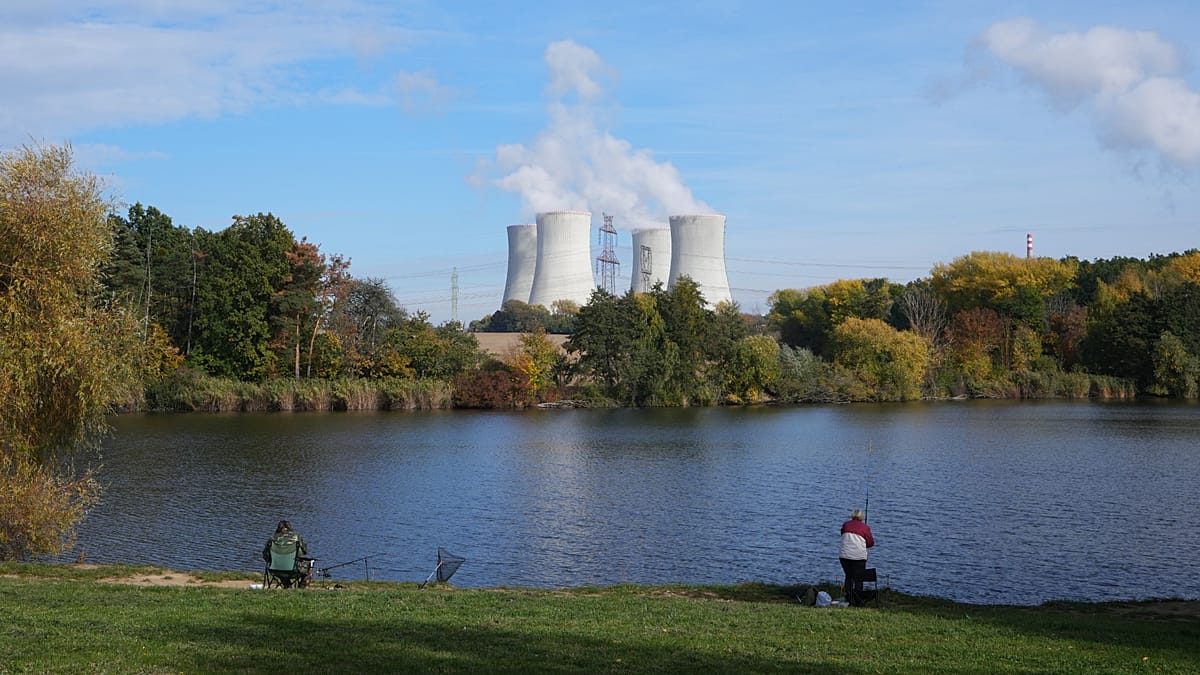By KAREL JANICEK with AP
Published on
The eight huge cooling towers of the Dukovany power plant overlook a construction site for two more reactors as Czechia pushes ahead with plans to expand its reliance on nuclear energy.
Mobile drilling rigs have been extracting samples 140 metres below ground for a geological survey to make sure the site is suitable for a $19 billion (€16.4 billion) project as part of the expansion that should eventually at least double the country’s nuclear output and cement its place among Europe’s most nuclear-dependent nations.
South Korea’s KHNP beat France’s EDF in a tender to construct a new plant whose two reactors will have an output of over 1,000 megawatts each. After becoming operational in the second half 2030s, they will complement Dukovany’s four 512-MW reactors that date from the 1980s.
The KHNP deal gives the Czechs an option to have two more units built at the other nuclear plant in Temelín, which currently has two 1,000-megawatt reactors.
Then, they are set to follow up with small modular nuclear reactors.
“Nuclear will generate between 50 per cent and 60 per cent (of energy) around 2050 in the Czechia, or maybe slightly more,” Petr Závodský, chief executive of the Dukovany project, told The Associated Press in an interview.
The nuclear expansion is needed to help the country wean itself off fossil fuels, secure steady, reliable supplies at a reasonable price, meet low-emission requirements, and enable robust demand for electricity expected in the coming years to power data centres and electric cars, Závodský said.
Europe’s nuclear revival
The Czech expansion comes at a time when surging energy demand and looming deadlines by countries and companies to sharply cut carbon pollution are helping to revive interest in nuclear technology.
While nuclear power does produce waste, it does not produce greenhouse gas emissions, like carbon dioxide, the main driver of climate change.
The European Union has accepted nuclear energy by including it in the classification system for environmentally sustainable economic activities, opening the door to financing. That has been a boost for Czechia, Slovakia, Hungary and France — the continent’s nuclear leader — that have heavily relied on nuclear.
Belgium and Sweden recently scrapped plans to phase out nuclear power. Denmark and Italy are reconsidering their use, while Poland is set to join a club of 12 nuclear-friendly nations in the European Union after signing a deal with US-based Westinghouse to build three nuclear units.
The EU generated 24 per cent of its electricity from nuclear electricity in 2024.
Britain signed a cooperation deal with the United States in September that Energy Secretary Ed Miliband said would lead to “a golden age of nuclear in this country.”
It will also invest £14.2 billion (€16.1 billion) to build the Sizewell C nuclear power plant, the first in the UK since 1995.
CEZ, the dominant Czech power company in which the government holds a 70 per cent stake, and Britain’s Rolls-Royce SMR have agreed on a strategic partnership to develop and deploy small modular nuclear reactors.
Money matters
The cost of the Dukovany project is estimated at over €16 billion, with the government agreeing to acquire an 80 per cent majority in the new plant.
The government will secure a loan for the new units that CEZ will repay over 30 years. The state will also guarantee a stable income from the electricity production for CEZ for 40 years. Approval is expected to be granted by the EU, which aims to become “climate-neutral” by 2050.
“We’re in a good position to argue that we won’t be able to do without new nuclear units,” Závodský said.
“Today, we get some 40 per cent electricity from nuclear, but we also currently get another 40 per cent from coal. It’s clear we have to replace the coal.”
Czechia is looking to phase out coal by 2033.
Uncertainty over financing has caused a significant delay in the nuclear expansion, however. In 2014, CEZ cancelled a tender to build two reactors at the existing Temelin nuclear plant after the government refused to provide financial guarantees.
Russia’s energy giant Rosatom and China’s CNG were excluded from the Dukovany tender on security grounds following the Kremlin’s invasion of Ukraine.
CEZ signed a deal with Westinghouse and France’s Framatome to supply nuclear fuel for its two nuclear plants, eliminating the country’s dependence on Russia. The contract with KHNP secures fuel supplies for 10 years.
Opposition to nuclear energy
While atomic energy enjoys public support, sceptical voices can be heard at home and abroad.
The Friends of the Earth say it is too costly, and the money could be better used for improving the industry. The country also still does not have a permanent storage facility for spent fuel.
The Dukovany and Temelín plants are located near the border with Austria, which abandoned nuclear energy after the 1986 Chernobyl nuclear explosion. In 2000, a dispute over the Temelín plant resulted in a political crisis and blocked border crossings for weeks.
Austria remains the most nuclear-sceptical EU country, and its lower house of Parliament has already rejected the Czech small modular reactors plan.

